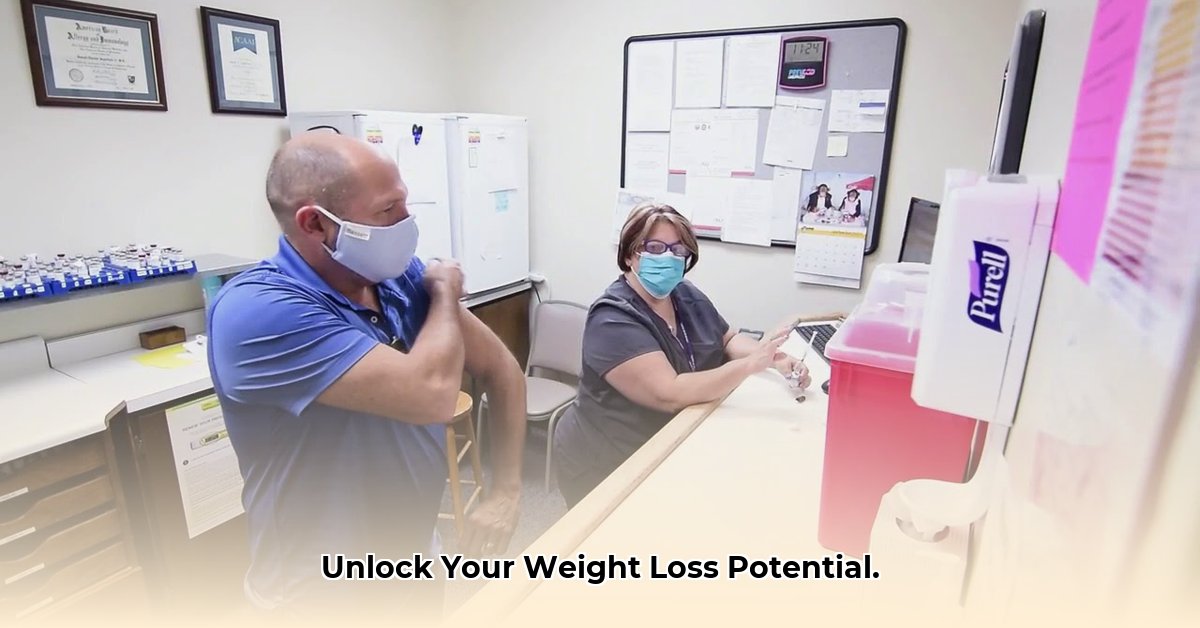
Losing weight effectively requires a strategic approach. Numerous weight loss clinics offer diverse strategies, each with potential benefits and drawbacks. This article compares Hickory Weight Loss Clinic's HCG-based program with medically supervised programs, providing a balanced perspective to aid informed decision-making. The focus is on factual information and evidence-based analysis, empowering readers to make choices aligned with their individual health needs.
Understanding Your Weight Loss Options: A Comparative Analysis
Choosing a weight loss plan significantly impacts overall health and well-being. Hickory Weight Loss Clinic utilizes HCG (human chorionic gonadotropin), a hormone not FDA-approved for weight loss, despite anecdotal reports of positive patient experiences. Conversely, many other clinics, such as FryeCare, employ FDA-approved methods, integrating prescription medications with lifestyle modifications including diet and exercise. This comparison highlights key distinctions to guide individual choices.
Comparing Weight Loss Approaches: HCG vs. Medically Supervised Programs
Two primary weight loss approaches exist: HCG-based programs (like Hickory Weight Loss Clinic's) and medically supervised programs. Understanding their differences is crucial for informed decision-making.
Hickory Weight Loss Clinic's HCG program raises concerns due to the FDA's lack of approval for weight loss. While some patients report success, the absence of FDA approval poses a significant risk consideration for many healthcare professionals. This contrasts sharply with medically supervised programs, typically involving FDA-approved medications and a holistic approach encompassing diet, exercise, and behavioral changes under professional guidance. The overarching aim is long-term, sustainable weight management.
The following table summarizes key differences:
| Feature | Hickory Weight Loss Clinic (HCG-Based) | Medically Supervised Programs (e.g., FryeCare) |
|---|---|---|
| FDA Approval | Not FDA-approved for weight loss | Uses FDA-approved medications and methods |
| Approach | Primarily focuses on HCG | Comprehensive: medication (if needed), diet, exercise, behavioral changes |
| Long-Term Effectiveness | Uncertain; requires further research | Generally better, due to integrated lifestyle changes |
| Potential Side Effects | Potential for moderate side effects; further research needed | Lower to moderate risk of side effects; typically well-documented |
| Transparency & Information | Requires increased transparency and detailed information disclosure | Typically more open and informative about the process and potential risks |
Key Factors to Consider When Choosing a Weight Loss Clinic
Before committing to any weight loss program, careful consideration of several factors is essential.
FDA Approval: Confirm if methods and medications possess FDA approval for weight loss; this signifies safety and efficacy.
Holistic Approach: Evaluate whether the program addresses diet, exercise, and behavioral modification, as sustainable weight management demands comprehensive lifestyle changes.
Transparency and Communication: Assess the clinic's openness in discussing methods, risks, and benefits; clear communication fosters trust.
Personalized Plans: Ensure the clinic develops plans tailored to individual needs and health status, recognizing the uniqueness of each health journey.
Ongoing Support: Verify the program's provision of continued support beyond the initial weight loss phase; maintaining weight loss necessitates long-term strategies.
Making the Right Choice for Your Weight Loss Journey
Selecting a weight loss clinic is a deeply personal decision. Carefully weigh the advantages and disadvantages of each option. While Hickory Weight Loss Clinic might appear as a rapid solution, the long-term implications of using unapproved treatments demand careful consideration. Medically supervised programs generally provide a safer and more sustainable path toward healthy weight management. Consult your physician before commencing any weight loss regimen. Your unique health journey requires a personalized approach tailored to your individual needs and objectives. Remember, it's a marathon, not a sprint.
How to Choose Between HCG and FDA-Approved Medical Weight Loss Programs
Navigating weight loss options requires a clear understanding of the differences between HCG and FDA-approved approaches. One path is supported by scientific evidence; the other, by anecdotal claims. Informed decision-making is paramount.
Key Takeaways:
- FDA-approved weight loss programs offer reduced risks due to rigorous research and testing.
- HCG diets lack robust scientific evidence of effectiveness and may involve significant health risks.
- A multidisciplinary approach encompassing medical, nutritional, and behavioral therapies generally produces better, sustained results.
- Prioritize clinics demonstrating transparency, employing board-certified specialists, and emphasizing long-term health.
- Thorough research and consultations are critical before committing to any weight loss program.
Understanding FDA-Approved Weight Loss Programs
FDA approval signifies rigorous testing and a proven safety profile, providing a high level of confidence in the program’s efficacy. These programs frequently involve medications, therapy, or a combination thereof, under medical supervision. This integrated approach targets both physical and psychological aspects of weight loss.
Benefits of FDA-approved programs include:
- Minimized risks of adverse effects compared to unproven methods.
- Effective and sustainable weight management strategies.
- Access to medical oversight and support.
The Risks of HCG Weight Loss Programs
HCG weight loss programs lack FDA approval. The FDA cautions against their use due to insufficient evidence of effectiveness and potential health risks. These programs often feature restrictive diets and HCG injections.
Disadvantages of HCG programs:
- Absence of robust scientific evidence supporting effectiveness.
- Potential for adverse health effects from restrictive diets and hormone injections.
- Increased likelihood of weight regain following program completion.
Making Informed Decisions: A Step-by-Step Guide
Step 1: Research and Compare: Investigate clinics offering both HCG and FDA-approved programs. Carefully review each program's details.
Step 2: Consult Multiple Professionals: Schedule consultations with healthcare providers specializing in obesity medicine. Discuss goals, health history, and preferences. Seek multiple opinions for informed choice.
Step 3: Prioritize Evidence-Based Practices: Choose a clinic utilizing FDA-approved medications, behavioral therapy, and a multidisciplinary team approach. Exercise caution with clinics solely promoting HCG or untested methods.
Step 4: Assess Clinic Transparency: Reputable clinics openly discuss risks, benefits, and costs. They provide clear information about staff qualifications and experience.
Step 5: Evaluate Long-Term Support: Weight loss is a continuous process. Ensure the clinic offers ongoing support and strategies for maintaining weight loss long-term.
By carefully considering these factors, you can make informed decisions, selecting a weight loss program aligned with your individual needs and health goals, ensuring a safe and successful path to a healthier you.